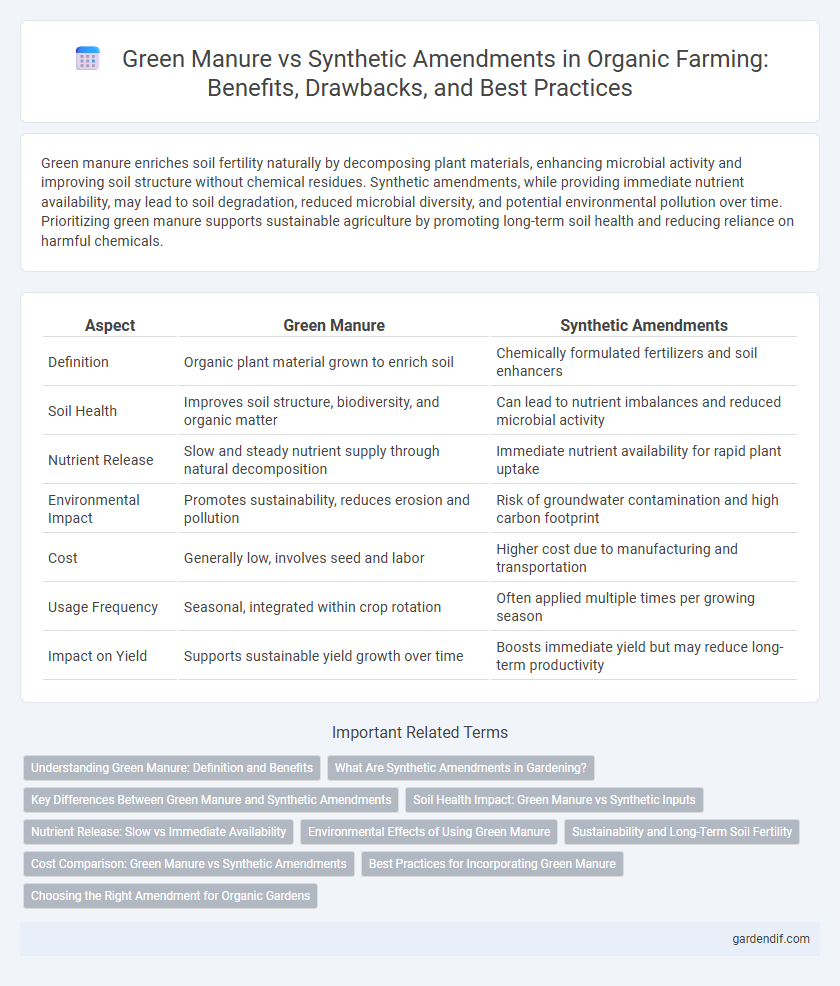
Green manure vs synthetic amendments Illustration
Green manure enriches soil fertility naturally by decomposing plant materials, enhancing microbial activity and improving soil structure without chemical residues. Synthetic amendments, while providing immediate nutrient availability, may lead to soil degradation, reduced microbial diversity, and potential environmental pollution over time. Prioritizing green manure supports sustainable agriculture by promoting long-term soil health and reducing reliance on harmful chemicals.
Table of Comparison
| Aspect | Green Manure | Synthetic Amendments |
|---|---|---|
| Definition | Organic plant material grown to enrich soil | Chemically formulated fertilizers and soil enhancers |
| Soil Health | Improves soil structure, biodiversity, and organic matter | Can lead to nutrient imbalances and reduced microbial activity |
| Nutrient Release | Slow and steady nutrient supply through natural decomposition | Immediate nutrient availability for rapid plant uptake |
| Environmental Impact | Promotes sustainability, reduces erosion and pollution | Risk of groundwater contamination and high carbon footprint |
| Cost | Generally low, involves seed and labor | Higher cost due to manufacturing and transportation |
| Usage Frequency | Seasonal, integrated within crop rotation | Often applied multiple times per growing season |
| Impact on Yield | Supports sustainable yield growth over time | Boosts immediate yield but may reduce long-term productivity |
Understanding Green Manure: Definition and Benefits
Green manure refers to the cultivation of specific plants, such as legumes and cover crops, which are grown primarily to be incorporated into the soil to enhance its fertility and organic matter content. These plants naturally fix atmospheric nitrogen, improve soil structure, increase microbial activity, and reduce erosion, leading to sustained soil health without the environmental risks associated with synthetic fertilizers. The use of green manure supports organic farming systems by promoting nutrient cycling and reducing dependence on chemical soil amendments.
What Are Synthetic Amendments in Gardening?
Synthetic amendments in gardening are man-made materials designed to enhance soil fertility and plant growth by supplying specific nutrients in concentrated forms. Common examples include chemical fertilizers like ammonium nitrate and superphosphate, which provide rapid nutrient availability but may lack the organic matter and microbial benefits seen in green manure. Unlike organic green manures that improve soil structure and promote biodiversity, synthetic amendments primarily focus on immediate nutrient supplementation.
Key Differences Between Green Manure and Synthetic Amendments
Green manure consists of organic plant materials grown and incorporated into soil to enhance fertility and microbial activity, whereas synthetic amendments are chemically formulated fertilizers designed to supply specific nutrients rapidly. Green manure improves soil structure, increases organic matter, and supports long-term soil health, while synthetic amendments primarily provide targeted nutrient boosts with minimal impact on soil biology. The slow nutrient release from green manure contrasts with the immediate availability of nutrients from synthetic amendments, influencing their respective roles in sustainable agriculture.
Soil Health Impact: Green Manure vs Synthetic Inputs
Green manure improves soil health by increasing organic matter, enhancing microbial diversity, and promoting nutrient cycling, which leads to better soil structure and fertility. Synthetic inputs provide immediate nutrient availability but can disrupt soil microbial communities and reduce long-term soil organic carbon levels. Sustainable soil management prioritizes green manure to maintain ecosystem balance and prevent soil degradation.
Nutrient Release: Slow vs Immediate Availability
Green manure provides a slow nutrient release by decomposing organic matter gradually, enriching soil with essential nutrients over time. Synthetic amendments offer immediate nutrient availability, supplying plants with quick access to nitrogen, phosphorus, and potassium. The sustained nutrient release from green manure supports long-term soil health, while synthetic options address short-term crop demands efficiently.
Environmental Effects of Using Green Manure
Green manure significantly enhances soil health by increasing organic matter, improving water retention, and promoting beneficial microbial activity, which leads to reduced soil erosion and enhanced carbon sequestration. Unlike synthetic amendments that may introduce harmful chemicals and contribute to groundwater contamination, green manure offers a natural way to recycle nutrients and support sustainable agriculture. The use of green manure also minimizes greenhouse gas emissions compared to synthetic fertilizers, helping mitigate climate change impacts.
Sustainability and Long-Term Soil Fertility
Green manure enhances soil sustainability by increasing organic matter, improving soil structure, and promoting beneficial microbial activity, which leads to long-term fertility without chemical residues. Synthetic amendments provide immediate nutrient availability but can degrade soil health over time by disrupting microbial communities and causing nutrient imbalances. Emphasizing green manure supports resilient ecosystems, reduces environmental impact, and ensures continuous nutrient cycling essential for sustainable agriculture.
Cost Comparison: Green Manure vs Synthetic Amendments
Green manure offers a cost-effective alternative to synthetic amendments by reducing the need for purchased fertilizers and enhancing soil fertility naturally through nitrogen fixation. Synthetic amendments often incur higher expenses due to manufacturing, transportation, and application rates, which can strain budgets despite their immediate nutrient availability. Long-term savings from green manure arise as it improves soil structure and microbial activity, lowering reliance on costly chemical inputs over multiple growing seasons.
Best Practices for Incorporating Green Manure
Incorporating green manure effectively involves selecting nitrogen-fixing cover crops such as clover or vetch to enhance soil fertility naturally. Best practices emphasize timely incorporation, ideally before flowering, to maximize nutrient availability and organic matter content. This method improves soil structure and microbial activity, offering sustainable alternatives to synthetic amendments.
Choosing the Right Amendment for Organic Gardens
Green manure enriches soil with natural nitrogen fixation and organic matter, enhancing microbial activity and soil structure without chemical residues. Synthetic amendments provide precise nutrient control but may disrupt soil ecology and are often restricted in certified organic gardening. Selecting green manure aligns with organic principles by improving fertility sustainably and promoting long-term soil health.
Green manure vs synthetic amendments Infographic

 gardendif.com
gardendif.com